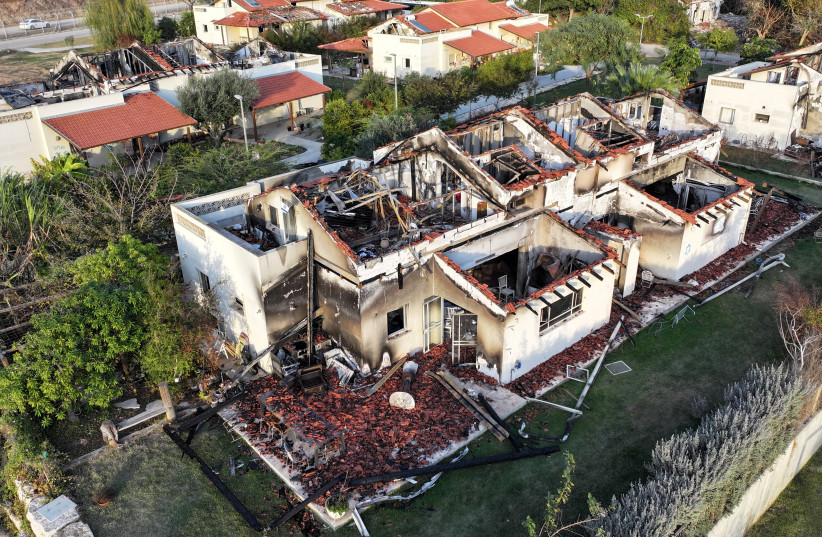It did not take long.
The IDF report on the Kibbutz Be’eri aspects of the October 7 disaster came out on Thursday. Within days, all of the infighting within the military – which sometimes has dissipated or been temporarily frozen – erupted into a full-fledged volcano.
This is without even getting into all of the finger pointing at Prime Minister Benjamin Netanyahu and his cabinet, who are still not even entertaining even being probed.
No, this is about the IDF field commanders who were criticized in the probe, such as Shaldag commander “A,” being furious with: IDF Chief of Staff Lt.-Gen. Herzi Halevi, IDF intelligence, and IDF Southern Command.
The field commanders who fought at Be’eri ask: How can you slam us for small-ball situational tactical errors – when we were in horrible, unreal positions, positions created by failures on the part of the military intelligence wing to warn of the invasion, and on Halevi and the Southern Command to have enough troops defending the border?
IDF Chief Spokesman R.-Adm. Daniel Hagari said that the probe was handled by one of the most senior, talented investigators – Maj.-Gen. Mickey Edelstein – and that because the errors were tactical, it was easier to finish it sooner. He added that issues related to Brig.-Gen. Barak Hiram’s involvement in a controversial episode in the kibbutz involving a tank fire on a home needed to be publicly resolved.

But this is only half of the answer.
There were scarcely several sentences about IDF intelligence and force posture failures in the Be’eri report. These sentences were general and laconic and named no names. All this, while the Shaldag commander and some other units were specifically named for errors.
Allowing IDF intelligence more freedom than field combat fighters
So, either this probe should not have named anyone until the IDF was ready to lay blame on specific intelligence and high command officials – meaning, everybody – and should have held those portions of the report until later, or it should have named some of the intelligence officials, even if the rest of the report on intelligence may need to wait.
There may be some logic in the report being ready sooner, but if sooner means “months” as opposed to “weeks,” the main message that comes out of the probe is that Halevi and the IDF high command are letting military intelligence maneuver more about how they are judged, more than what is being apportioned to the Be’eri field combat fighters and commanders.
Many are questioning how this can be fair.
This latest infighting in the IDF extends to IDF Southern Command’s fury with IDF intelligence, and worry about how Halevi will eventually treat them. If Halevi and the high command were willing to leave lower field commanders out to dry, why might they not do the same to top IDF Southern Command officials?
This latest blowup is also about infighting within IDF intelligence itself.
The military’s intelligence analysis division and Unit 8200 are currently at war to lay more blame on each other for failing to foresee the invasion.
Intelligence analysis is slamming Unit 8200 for not passing on, or being loud about, all of its findings, such as the hundreds of Israeli SIM cards that lit up in Gaza on October 6. Unit 8200 is blasting intelligence analysis, saying it is a data-collecting unit, not the one responsible for drawing conclusions about whether or not war is coming. It also says that the tone set by intelligence analysis was to be dismissive of any evidence that Hamas could pose a threat.
The man everyone wants is Unit 8200 head, Chief Brig.-Gen. Yossi Sariel, who himself is trying to ride out the tide to finish his term in February 2025. From his perspective, the IDF came to him and asked him to rejoin the military after he spent time making big bucks in the private sector. He would further argue that intelligence analysis sets the parameters for what intelligence to collect and through which lens to view it.
His critics would say he was the one most dismissive of Hamas and of needing ground troops, believing he and his unit had ultimate supremacy in knowing everything and anything that Hamas might be trying to do with their fancy technological collection means.
There have also been accusations that incoming IDF intelligence chief Shlomi Binder froze appointments within IDF intelligence because he intends to clean house. The IDF responded that no appointments have been frozen, not in IDF intelligence analysis nor Unit 8200. It added that Unit 8200 has had major achievements during the war, while acknowledging that the unit was “part of the failure which is currently being probed.”
The military said that Sariel will take public and personal responsibility for October 7 at some undefined point in the future – though it would seem it will be at least two months away.
Meanwhile, only one official from the Shin Bet has resigned – “A,” the commander of Shin Bet Southern Command – and that only happened around two weeks ago, the resignation was not announced officially by the Shin Bet, and when questioned about it, the agency presented the situation as his having finished a three year term and taking “collective” responsibility.
Sources have indicated to The Jerusalem Post that the Shin Bet may be nowhere near a point where it would publish its findings.
Throughout the last several months, it appears that both Halevi and the Shin Bet were frustrated with Netanyahu’s refusal to have himself probed, and that they have been slowing probes of their own organizations, hoping that time would force the prime minister to get in line with the rest of the top officials and get investigated.
In the meantime, many are saying that until Halevi and Shin Bet Chief Ronen Bar step down, the ferocious winds turning portions of the defense establishment against each other will not subside.•
